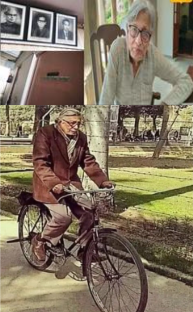– M Rafi Ahmed
Being a Professor Emeritus isn’t just a job, it is a lifestyle. As to the maxim, Prof Emeritus and noted medieval historian Irfan Habib (94) keeps himself busy as age is just a number for this scholar nonpareil, who makes it a point to visit his chamber at the History Department of Aligarh Muslim University (AMU). Great to infer that he derives immense pleasure in interacting with the research students.
He is reported to have said in a recent interview to a YouTube channel that he goes there to meet his colleagues, catch up on the gossip twice or thrice a week. At the university, teachers and students drop in to meet him regularly, seeking his guidance on a range of subjects. “Our classroom is next to Prof Habib’s chamber and I go and meet him often and ask him for suggestions. He is very friendly and is always ready to help us,” a PG student at the department revealed.
Meanwhile, Irfan Habib is quoted saying, “I would always cycle to the university.” A fall about 10 years ago put a stop to it. “I fell and it was not a nice sight. So, I stopped cycling. Now I go in a lordly way in a car”. The cycle, an institution in its own right, now stands in one part of the bathroom, an unlikely bath accessory. As a teacher, he always encouraged the students to question. It is interesting to learn that Habib was instrumental in making many students take history which is close to his heart.
Flipping through the pages of history, this scribe zeroed in some interesting info about Padma Bhushan Professor Irfan Habib. Born on August 10, 1931, in Vadodara, Gujarat, is a towering figure in the study of medieval Indian history, renowned for his Marxist historiography and contributions to economic and social history. A Professor Emeritus at AMU, Habib, at 94, remains a vibrant scholar embodying a lifelong passion for knowledge.
Hailing from a family deeply rooted in India’s freedom movement, his work has reshaped understanding of the Mughal era, ancient India, and colonialism’s impact, earning him global acclaim and prestigious honours. Habib’s academic journey began at AMU, where he earned his BA and MA in history, followed by a DPhil from Oxford University under C.C. Davies.
Joining AMU’s faculty, he served as Professor of History from 1969 to 1991 and is now Professor Emeritus. His seminal works include The Agrarian System of Mughal India, 1556–1707 (1963), a ground-breaking study of Mughal economic structures, and An Atlas of the Mughal Empire (1982), mapping political and economic landscapes. As general editor of the People’s History of India series, he has overseen 30+ volumes, covering prehistory to modern times, blending rigorous scholarship with accessible narratives.
His Marxist approach emphasises economic structures and class relations, challenging colonial and nationalist historiographies. Habib’s research spans ancient Indian technology, medieval administration, and the impact of British rule, earning praise from peers like Indian Economic Historian Amiya Kumar Bagchi, who called him one of India’s greatest living historians of the 20th century.
Noteworthy to mention that he grew up in a prominent Muslim family wherein Habib’s heritage is steeped in India’s independence struggle. His father, Mohammad Habib, was a noted historian and Indian National Congress member, and his mother, Sohaila, was the daughter of Abbas Tyabji, a Gandhian and former Chief Justice of Baroda.
This legacy shaped Habib’s commitment to secularism and social justice, evident in his vocal opposition to Hindutva and “saffronisation” of history. At the 1998 Indian History Congress, he led a resolution against rewriting history to suit political agendas, criticising BJP-led textbook revisions that marginalised Muslim contributions.
Habib’s contributions fetched him honours including Watumull Prize (1982), and a 2021 Honorary Fellowship from New College, Oxford. He served as Chairman of the Indian Council of Historical Research (1986-90) and General President of the Indian History Congress (1981), shaping historical discourse. His books, like Medieval India: The Study of a Civilization (2008), remain essential for students and scholars. The words of Aristotle – “Pleasure in the job puts perfection in the work – aptly fit in to historian Irfan Habib.
[The author is former Indian Express and Deccan Chronicle chief]




